[学問のすすめ YouTube]、
福沢諭吉、
[Fukuzawa Yukichi]
[an encouragement of learning],
[YouTube]
・偉人伝[独立自尊! 国家の独立は国民の独立から!(前編)]、
[(後編)]
・[100分de名著 福沢諭吉]part①②➂➃
・「福沢諭吉の名言」15話 、
・≪AI朗読 全≫学問のすすめ[福沢諭吉]《青空文庫》 、
・(学問のすすめ 初編/朗読),
(二編/朗読),
(三編/朗読),
(四編/朗読),
(五編/朗読),
(六編/朗読)、
・●福沢諭吉【学問のすすめを超わかりやすく解説】、
・●朗読 「学問のすすめ」 前半01編~10編(約3時間、
・学問のすゝめ 青空文庫,
(YouTube),
・学問のすすめ初編~十七編(慶大図書).pdf,
デジタルで読む福澤諭吉(慶大図書).pdf,
・福翁自傳(M32.6),
【国立国会図書館 福沢諭吉】
【学問のすすめ】
【学問のすすめ(現代語訳)】
【学問のすすめ(子ども向け)】
初編
「天は人の上に人を造らず人の下に人を造らず」
と言えり。されば天より人を生ずるには、万人は万人みな同じ位にして、生まれながら貴賤上下の差別なく、万物の霊たる身と心との働きをもって天地の間にあるよろずの物を資り、もって衣食住の用を達し、自由自在、互いに人の妨げをなさずしておのおの安楽にこの世を渡らしめ給うの趣意なり。されども今、広くこの人間世界を見渡すに、かしこき人あり、おろかなる人あり、貧しきもあり、富めるもあり、貴人もあり、下人もありて、その有様雲と泥との相違あるに似たるはなんぞや。その次第はなはだ明らかなり。『実語教』に、
「人学ばざれば智なし、智なき者は愚人なり」
とあり。されば賢人と愚人との別は学ぶと学ばざるとによりてできるものなり。また世の中にむずかしき仕事もあり、やすき仕事もあり。そのむずかしき仕事をする者を身分重き人と名づけ、やすき仕事をする者を身分軽き人という。すべて心を用い、心配する仕事はむずかしくして、手足を用うる力役はやすし。ゆえに医者、学者、政府の役人、または大なる商売をする町人、あまたの奉公人を召し使う大百姓などは、身分重くして貴き者と言うべし。
身分重くして貴ければおのずからその家も富んで、下々の者より見れば及ぶべからざるようなれども、その本を尋ぬればただその人に学問の力あるとなきとによりてその相違もできたるのみにて、天より定めたる約束にあらず。諺にいわく、「天は富貴を人に与えずして、これをその人の働きに与うるものなり」と。されば前にも言えるとおり、人は生まれながらにして貴賤・貧富の別なし。ただ学問を勤めて物事をよく知る者は貴人となり富人となり、無学なる者は貧人となり下人となるなり。
学問とは、ただむずかしき字を知り、解し難き古文を読み、和歌を楽しみ、詩を作るなど、世上に実のなき文学を言うにあらず。これらの文学もおのずから人の心を悦ばしめずいぶん調法なるものなれども、古来、世間の儒者・和学者などの申すよう、さまであがめ貴むべきものにあらず。古来、漢学者に世帯持ちの上手なる者も少なく、和歌をよくして商売に巧者なる町人もまれなり。これがため心ある町人・百姓は、その子の学問に出精するを見て、やがて身代を持ち崩すならんとて親心に心配する者あり。無理ならぬことなり。畢竟その学問の実に遠くして日用の間に合わぬ証拠なり。
されば今、かかる実なき学問はまず次にし、もっぱら勤むべきは人間普通日用に近き実学なり。譬えば、いろは四十七文字を習い、手紙の文言、帳合いの仕方、算盤の稽古、天秤の取扱い等を心得、なおまた進んで学ぶべき箇条ははなはだ多し。地理学とは日本国中はもちろん世界万国の風土道案内なり。究理学とは天地万物の性質を見て、その働きを知る学問なり。歴史とは年代記のくわしきものにて万国古今の有様を詮索する書物なり。経済学とは一身一家の世帯より天下の世帯を説きたるものなり。修身学とは身の行ないを修め、人に交わり、この世を渡るべき天然の道理を述べたるものなり。
これらの学問をするに、いずれも西洋の翻訳書を取り調べ、たいていのことは日本の仮名にて用を便じ、あるいは年少にして文才ある者へは横文字をも読ませ、一科一学も実事を押え、その事につきその物に従い、近く物事の道理を求めて今日の用を達すべきなり。右は人間普通の実学にて、人たる者は貴賤上下の区別なく、みなことごとくたしなむべき心得なれば、この心得ありて後に、士農工商おのおのその分を尽くし、銘々の家業を営み、身も独立し、家も独立し、天下国家も独立すべきなり。
学問をするには分限を知ること肝要なり。人の天然生まれつきは、繋がれず縛られず、一人前の男は男、一人前の女は女にて、自由自在なる者なれども、ただ自由自在とのみ唱えて分限を知らざればわがまま放蕩に陥ること多し。すなわちその分限とは、天の道理に基づき人の情に従い、他人の妨げをなさずしてわが一身の自由を達することなり。自由とわがままとの界は、他人の妨げをなすとなさざるとの間にあり。譬えば自分の金銀を費やしてなすことなれば、たとい酒色に耽り放蕩を尽くすも自由自在なるべきに似たれども、けっして然らず、一人の放蕩は諸人の手本となり、ついに世間の風俗を乱りて人の教えに妨げをなすがゆえに、その費やすところの金銀はその人のものたりとも、その罪許すべからず。
また自由独立のことは人の一身にあるのみならず、一国の上にもあることなり。わが日本はアジヤ州の東に離れたる一個の島国にて、古来外国と交わりを結ばず、ひとり自国の産物のみを衣食して不足と思いしこともなかりしが、嘉永年中アメリカ人渡来せしより外国交易のこと始まり、今日の有様に及びしことにて、開港の後もいろいろと議論多く、鎖国攘夷などとやかましく言いし者もありしかども、その見るところはなはだ狭く、諺に言う「井の底の蛙」にて、その議論とるに足らず。日本とても西洋諸国とても同じ天地の間にありて、同じ日輪に照らされ、同じ月を眺め、海をともにし、空気をともにし、情合い相同じき人民なれば、ここに余るものは彼に渡し、彼に余るものは我に取り、互いに相教え互いに相学び、恥ずることもなく誇ることもなく、互いに便利を達し互いにその幸いを祈り、天理人道に従いて互いの交わりを結び、理のためにはアフリカの黒奴にも恐れ入り、道のためにはイギリス・アメリカの軍艦をも恐れず、国の恥辱とありては日本国中の人民一人も残らず命を棄てて国の威光を落とさざるこそ、一国の自由独立と申すべきなり。
しかるを支那人などのごとく、わが国よりほかに国なきごとく、外国の人を見ればひとくちに夷狄夷狄と唱え、四足にてあるく畜類のようにこれを賤しめこれを嫌い、自国の力をも計らずしてみだりに外国人を追い払わんとし、かえってその夷狄に窘しめらるるなどの始末は、実に国の分限を知らず、一人の身の上にて言えば天然の自由を達せずしてわがまま放蕩に陥る者と言うべし。王制一度新たなりしより以来、わが日本の政風大いに改まり、外は万国の公法をもって外国に交わり、内は人民に自由独立の趣旨を示し、すでに平民へ苗字・乗馬を許せしがごときは開闢以来の一美事、士農工商四民の位を一様にするの基ここに定まりたりと言うべきなり。
されば今より後は日本国中の人民に、生まれながらその身につきたる位などと申すはまずなき姿にて、ただその人の才徳とその居処とによりて位もあるものなり。たとえば政府の官吏を粗略にせざるは当然のことなれども、こはその人の身の貴きにあらず、その人の才徳をもってその役儀を勤め、国民のために貴き国法を取り扱うがゆえにこれを貴ぶのみ。人の貴きにあらず、国法の貴きなり。旧幕府の時代、東海道にお茶壺の通行せしは、みな人の知るところなり。そのほか御用の鷹は人よりも貴く、御用の馬には往来の旅人も路を避くる等、すべて御用の二字を付くれば、石にても瓦にても恐ろしく貴きもののように見え、世の中の人も数千百年の古よりこれを嫌いながらまた自然にその仕来りに慣れ、上下互いに見苦しき風俗を成せしことなれども、畢竟これらはみな法の貴きにもあらず、品物の貴きにもあらず、ただいたずらに政府の威光を張り人を畏して人の自由を妨げんとする卑怯なる仕方にて、実なき虚威というものなり。今日に至りてはもはや全日本国内にかかる浅ましき制度、風俗は絶えてなきはずなれば、人々安心いたし、かりそめにも政府に対して不平をいだくことあらば、これを包みかくして暗に上を怨むることなく、その路を求め、その筋により静かにこれを訴えて遠慮なく議論すべし。天理人情にさえ叶うことならば、一命をも抛ちて争うべきなり。これすなわち一国人民たる者の分限と申すものなり。
前条に言えるとおり、人の一身も一国も、天の道理に基づきて不覊自由なるものなれば、もしこの一国の自由を妨げんとする者あらば世界万国を敵とするも恐るるに足らず、この一身の自由を妨げんとする者あらば政府の官吏も憚るに足らず。ましてこのごろは四民同等の基本も立ちしことなれば、いずれも安心いたし、ただ天理に従いて存分に事をなすべしとは申しながら、およそ人たる者はそれぞれの身分あれば、またその身分に従い相応の才徳なかるべからず。身に才徳を備えんとするには物事の理を知らざるべからず。物事の理を知らんとするには字を学ばざるべからず。これすなわち学問の急務なるわけなり。
昨今の有様を見るに、農工商の三民はその身分以前に百倍し、やがて士族と肩を並ぶるの勢いに至り、今日にても三民のうちに人物あれば政府の上に採用せらるべき道すでに開けたることなれば、よくその身分を顧み、わが身分を重きものと思い、卑劣の所行あるべからず。およそ世の中に無知文盲の民ほど憐れむべくまた悪むべきものはあらず。智恵なきの極みは恥を知らざるに至り、己が無智をもって貧窮に陥り飢寒に迫るときは、己が身を罪せずしてみだりに傍の富める人を怨み、はなはだしきは徒党を結び強訴・一揆などとて乱暴に及ぶことあり。恥を知らざるとや言わん、法を恐れずとや言わん。天下の法度を頼みてその身の安全を保ち、その家の渡世をいたしながら、その頼むところのみを頼みて、己が私欲のためにはまたこれを破る、前後不都合の次第ならずや。あるいはたまたま身本慥かにして相応の身代ある者も、金銭を貯うることを知りて子孫を教うることを知らず。教えざる子孫なればその愚なるもまた怪しむに足らず。ついには遊惰放蕩に流れ、先祖の家督をも一朝の煙となす者少なからず。
かかる愚民を支配するにはとても道理をもって諭すべき方便なければ、ただ威をもって畏すのみ。西洋の諺に「愚民の上に苛き政府あり」とはこのことなり。こは政府の苛きにあらず、愚民のみずから招く災なり。愚民の上に苛き政府あれば、良民の上には良き政府あるの理なり。ゆえに今わが日本国においてもこの人民ありてこの政治あるなり。仮りに人民の徳義今日よりも衰えてなお無学文盲に沈むことあらば、政府の法も今一段厳重になるべく、もしまた、人民みな学問に志して、物事の理を知り、文明の風に赴くことあらば、政府の法もなおまた寛仁大度の場合に及ぶべし。法の苛きと寛やかなるとは、ただ人民の徳不徳によりておのずから加減あるのみ。人誰か苛政を好みて良政を悪む者あらん、誰か本国の富強を祈らざる者あらん、誰か外国の侮りを甘んずる者あらん、これすなわち人たる者の常の情なり。今の世に生まれ報国の心あらん者は、必ずしも身を苦しめ思いを焦がすほどの心配あるにあらず。ただその大切なる目当ては、この人情に基づきてまず一身の行ないを正し、厚く学に志し、博く事を知り、銘々の身分に相応すべきほどの智徳を備えて、政府はその政を施すに易く、諸民はその支配を受けて苦しみなきよう、互いにその所を得てともに全国の太平を護らんとするの一事のみ。今余輩の勧むる学問ももっぱらこの一事をもって趣旨とせり。
端書
このたび余輩の故郷中津に学校を開くにつき、学問の趣意を記して旧く交わりたる同郷の友人へ示さんがため一冊を綴りしかば、或る人これを見ていわく、「この冊子をひとり中津の人へのみ示さんより、広く世間に布告せばその益もまた広かるべし」との勧めにより、すなわち慶応義塾の活字版をもってこれを摺り、同志の一覧に供うるなり。
明治四年未十二月
福沢諭吉
引用文献
TOP
[Sample Translation]
Encouragement for Learning (学問ノススメ)
Fukuzawa Yukichi
*Fukuzawa Yukichi (1835-1901) was a Japanese educator, author and journalist, who founded the Keio Gijuku University. He was an introducer of the Western thoughts, political and economic systems, and was a most influential enlightenment thinker in Meiji Japan. His Encouragement for Learning was one of the best selling book of that time.
Encouragement for Learning
Fukuzawa Yukichi
Part One
The Heaven is said to create no man on the top of a man or under. It means, since they are created by the Heaven, all people, equal and born equal with no difference in their social standing, are able to work with soul and body to enjoy everything in the world for their use, controlling the lives of their own without hindering others, so that they can make a comfortable living in this world. However, looking over this world of human beings, some are wise and others are dull; some are poor and others are wealthy; some are noble and others are menial. How is it that they are such differences as heaven and earth? It is quite obvious. According to Jitsugokyo (“Lessons of Reality Words”), a fool is a man with no intellect, and a man without learning cannot have intellect. Accordingly, the difference between the wise and the unwise is nothing but the difference between the learned and the unlearned. In this world, some jobs are difficult to do and others are easier. Those doing such difficult jobs are in an important position in society. Those doing easy jobs are in a lighter position. In general, your brain and mind is used for difficult jobs while physical labors are easier. Therefore, you can say that doctors, scholars, government officials, merchants doing big business or farmers employing lots of workers are in an important, respectable position. As a natural result of such positions, they are so rich and wealthy that people in a low standing may consider it should be impossible for them to reach there. However, the basis of the difference between them is nothing but whether they enjoy the power of learning or not. The difference is not an unavoidable fate. There is a saying that the Heaven does give wealth not to people but to their work. As I discussed before, therefore, people are born with no difference in their social standing and wealth. People become noble and wealthy if they study and learn things well. They become poor and menial if they do not learn.
By the word “learning” I do not mean merely unpractical literature such as knowledge of difficult Chinese characters, reading of classics that are hard to understand, or creation of Japanese or Chinese poems. Such literature is useful in a way, since it gives pleasure to people’s mind, but you do not need to respect it too much like the Confucians and the Japanese classic scholars insisting on it. From time immemorial, most of the Confucians are poor at household management. If a merchant is an excellent poet, he may not be a great businessman. Therefore, thoughtful merchants or farmers may well worry about the future of their sons who are studying so hard, since they consider such learning may be destructive for their business. Evidently, such study is far from the reality and does not meet the needs of daily life. For this reason, you should put off such unrealistic studies. What we should work on first is the realistic studies that are close to the ordinary daily needs of people. You need first to learn, for example, the forty-seven letters of the Japanese alphabet, wordings and expressions for letters, how to keep accounts or books, skills for using an abacus and a steelyard, and then there still is very much to learn. Geography guides you through a variety of natural features of the world, not to mention within Japan. Physics or natural philosophy is the science to see through the nature of all physical things to find out their functions. History is documentations that are detailed chronicles to be searched for the past and present conditions of various countries. Economics is explanations of finance of the entire society on the basis of finance of a person or a family. Ethics is clarifications of natural reasons on which one should discipline oneself, associate with others and walk through the world. To learn basics of such studies, you just need to study the books translated from the Western languages, which means the Japanese language is good enough for such learning. The young and talented should have a chance to read in Western languages, but should base each of his study on the reality, following the real things, and seeking for reasons in matters close to himself in order to meet the needs of today. It is the practical science for all human beings that I have discussed above. This is the common knowledge that all people, noble or menial, should learn. Learning such knowledge, people could be able to do their best to operate their own functions or businesses as samurai, farmers, craftsmen or merchants so that they, as individuals, will be independent and that their families will be independent. And so will the whole nation.
For learning, it is essential to know your standing in society. Human beings in the natural state are unbound, as men or as women, without any ties that restrict their liberty. In many cases, however, those who insist on liberty will be just selfish if they take no notice to the standing of their own. By the word “standing,” I mean the reasonable, humane way to attain or reach one’s freedom without hindering others. The difference between the liberty and the selfishness consists in whether it hinders others or not. You are not right if you think you are free to dissipate your own money extravagantly for any kind of pleasures. For your dissipation may be followed or modeled by others, and it may corrupt good morals of society, resulting in hindrance of education. Such conduct is therefore an unforgivable sin, even when you just waste the fortune of your own. In addition, freedom and independence is not only a personal matter, but also an issue of the nation. Japan is an island country, at the east end of Asia, where in the past the people were just content with the domestic products without communicating with foreign nations. When Americans visited us in 1850’s, however, our nation started the foreign trade as we do today. Even after the opening of the ports, there were lots of arguments. Some loudly asserted the seclusionist or exclusionist policy, but their views were so narrow as those of a frog in the well. Their opinions were unworthy to discuss. The Japanese and the Western nations are peoples on the same planet, sharing the sunshine, the moonlights, the oceans and the atmosphere, living with the same human sentiments. If we have something in excess, we can hand it over to them. If they have something more than enough, we may ask them for it. With no arrogance or obsequiousness, the international community must teach each other, learn each other and benefit each other, wishing for each other’s happiness. International relations must be based on the universal reasons and the humanity. You must behave reverentially toward African blacks if it is reasonable. If you find the British or the Americans conducting against the humanity, you must not be frightened of their warship. Should there be a disgrace to our nation, all the Japanese throughout the country would be ready to risk their life to keep our national dignity. That should be the way the nation is free and independent. […]
by English Translation
TOP
Encouragement for Learning (学問ノススメ)
1
They say, "Heaven did not create a man above or below another man." It means that Heaven created all human beings equal and there was no difference among people. As the lords of creation, they could use all things in the world by exercising their own body and brain for their clothing, food and housing. Freely, unless they bother others, they could live comfortably. That's what Heaven created.
But now, observing human societies, there are the wise and the foolish, the poor and the rich, the noble and the plebeian. What does make these differences?
It's obvious. The book named Jitsugo-kyou says, "A man cannot have wisdom without learning. A man without wisdom is foolish." In other words, the difference between the wise and the foolish depends on how they learned. And there are difficult work and easy work. People consider a person who does difficult work as the upper class and a person who does easy work as the lower class. The work using brain is difficult and the work using body is easy. So you can say that doctors, scholars, governmental officers, merchants who do big business and farmers who hire many peasants are the upper class.
If you are the upper class, you can be rich spontaneously. And from the lower class people's view, you seem far beyond their reach. But there is nothing but learned wisdom in the difference between your and their ability. Heaven did not set up the difference. As a proverb says, "Heaven does not give fortune to a man, but to a man's workings." And as I have already said, there is no natural difference among people. A person who learned well and has wisdom can be the upper class and rich, and a person who did not learn and has no wisdom become the lower class and poor.
2
Learning does not mean practically useless studies, such as only to learn difficult kanji characters, to read difficult old books, to enjoy waka poems or to compose poetry. These studies are entertaining and sometimes useful. But they are not so valuable as Confucians and Kokugaku scholars say.
There are few scholars of the Chinese classics who are good at livelihood and townspeople who are good at both waka poetry and business from old times. So thoughtful townspeople and farmers are worried about their children, that they may lose their property by learning too hard. We cannot blame them. This is a good evidence that those studies are practically useless in daily life.
So you have to learn practical sciences that are useful in daily life now and leave useless studies until later. For example, you have to learn 47 hiragana characters at first. Then letter writing, accounting, calculation and how to use a balance. You have a lot of things to learn.
Geography is a science to guide not only Japan but also natural features of all countries in the world. Physics is a science to study all phenomena in the world and to know those workings. History is a science, as it were more detailed Chronology, to study the world's transition from past to present. Economics is a science to explain from a person's and a family's budget to the money flow around the world. Moral science is a science to learn how to behave, how to associate with others and how to conduct yourself in society.
When you learn these sciences, you have to consult translations of original western books, use easy words instead of difficult kanji characters, make talented young people read original western books, value facts in each science, follow objective facts, pursue reasons of your near affairs and accomplish your purpose in need now.
These are practical sciences and common knowledge that all people should learn regardless of one's status. After you learn them and fulfill your obligations according to your each status, a person, a family and a nation can be independent.
3
It is important to know obligations when you learn. When you were born, you were not restricted by anyone. As a man or a woman, everyone is free. But if you don't know that you also have obligations, you will become selfish. The obligations are, that you have to be based on Heaven's reason, follow humanity, and obtain your freedom without bothering others.
The border between freedom and selfishness is whether you bother others or not. Perhaps you think it is your freedom to indulge in debauchery and waste your own money. But it is wrong. If you did such a thing, others would imitate you, then they would corrupt public morals and obstruct the civilization of the people. So you don't have the right to do such a thing even if you have money.
Freedom and Independence are not only for individuals but also for nations. Japan is an island country of east Asia, and had been isolated and self-sufficient from old times. But in the Kaei period (1848-1854), Americans came to Japan and began trade with us. Even after the opening of the country, many people were advocating isolationism and exclusionism. But they were just narrow-minded, as the proverb says “The frog in the well doesn't know the ocean.” We don't have to listen to such people.
Japan and Western countries are between the same Heaven and Earth, bask in the same sun, look up the same moon, and share oceans and the atmosphere. As human beings we can understand each other. So we should give them our surplus and get their surplus, teach and learn each other. We don't have to be ashamed or arrogant. We should cooperate with them and pray for them each other, associate with them by following Heaven's reason and humanity, yield to even black slaves if they have reasonable grounds, and not yield to even English or American battle ships if they are against humanity. If they dishonored our country, all Japanese people should stand up for national prestige at the risk of our lives. This is the national freedom and independence.
Chinese people are arrogant as if there were no other countries. They call foreign people “barbarians” and look down them as if they were not human being. They don't understand their national strength and are trying to get rid of foreign people. But they are suffered from foreign people by contraries. They don't know their place. In other words for individuals, they misunderstand their freedom and have been selfish.
After the Meiji Restoration, Japanese politics has extremely changed. The government has relations with other countries with international law, and governs the country with the policy of freedom and independence. The government has already allowed the commoners to have a family name and ride a horse. This is a brilliant achievement since the beginning of this country. It helps us to unite the four categories of the people, warriors, farmers, artisans and tradesmen.
From now on, all Japanese people are equal and you can achieve status with your ability, virtue and business. For example, it's natural that you should not make light of government officials. This is not because they are noble, but because they have gained their position with their abilities and virtue, and manage the national law for the people. We should respect them not for themselves, but for the national law.
In the Edo period, when the procession transporting tea for the Shogun went along the Tokaido, neighborhood residents shut themselves up in their home with fear. Shogun's hawk was nobler than people and travelers had to give way to Shogunate's horses. People were afraid of even stones and tiles if those were used for Shogunate. People had thought that these were a nuisance from old times, but on the other hand, they had got used to them. These ugly custom had been made by both high and low class people. They did not respect either Shogunate's law or those goods. It was just because Shogunate was arrogant, threaten its people and restricted their freedom. It was a cowardly way and meaningless bravado.
But nowadays, these shameful custom must no longer exist in Japan. So people should trust the government. If you are displeased with the government, you should not hide your grievance and should not have a grudge against it. You should appeal peacefully and argue the right and wrong of the matter. If your claim meets Heaven's reason and humanity, you should assert it at the risk of your life. These are obligations as the people of a nation.
4
As I said before, a man and a nation are free. If there are countries that violate national independence, you don't have to be afraid of even all countries around the world. If someone violates your freedom, you don't have to be afraid of even governmental officers. Four categories of the people are equal now, so you don't have to be worried and you can do as you wish, as long as you follow Heaven's reason. But everyone has their position and must have proper ability and virtue for each position. If you want to improve your ability and virtue, you have to know the reasons of things. If you want to know the reasons of things, you have to learn. This is the reason that learning is urgently required now.
Recently, positions of the people of three categories, farmers, artisans and tradesmen, have been raised hundred times, and some of them rival warrior class now. If you have enough ability and virtue, you can become a governmental officer. So you have to consider the position, know your responsibilities and must not perform evil deeds.
Ignorant people are the most pitiful and nuisance in the world. They have no shame because they have no wisdom. They become poor by their ignorance. When they suffer extreme poverty, they blame the rich instead of themselves. Some of them riot and plunder in a group. This is a shameless act against law. Although they live peacefully under the protection of the law, when it becomes inconvenient, they violate the law for self-interest. This is inconsistent, isn't it?
Even rich people from a good family only know saving money and don't know educating their children. There is no wonder those uneducated children become foolish. In due course, a lot of them indulge in dissipation and become bankrupt.
To rule the ignorant people, you cannot lead them by reason, you have to threaten them by force. The Western proverb says, "There is a severe government over ignorant people." This is not because the government is severe, but because those ignorant people cause the disaster. If there is a severe government over ignorant people, there is a good government over good people. In Japan now, there is this government because there are these people.
If the people's morals degenerated and they became more ignorant, the government would be more severe. On the contrary, if the people learned eagerly and they knew the reasons of things and got sophisticated, the government would be more tolerant. Whether laws are severe or tolerant, depends on whether the people have morals or not. There are no people who like severe laws and dislike good government. There are no people who don't hope that their country become rich and strong. There are no people who willingly accept an insult from foreign countries. These are natural feelings for people.
If you aspire to serve the country now, you don't have to be anguished or worried. The important things are, to behave righteously with humanity, to learn eagerly, to have broad knowledge and to acquire wisdom and virtue according to each position. If so, the government would govern the country easily, the people would live peacefully, and they would fulfill their obligations to each other and keep the national peace together. This is the ultimate purpose of learning, that I am encouraging now.
Postscript
When we established a school in our hometown Nakatsu, we wrote the purpose of learning for our old friends. Someone read it and proposed, "You should publish this booklet not only to the people of Nakatsu, but also to the Japanese public. If so, it will benefit more people." Thus we printed this book with a letterpress printing machine at Keio Gijuku, for the people who have the same ambition with us.
December, 1871
Fukuzawa Yukichi
Obata Tokujirō
by Part One, English Translation
TOP
1.学問のすすめ 現代語訳
初編 (学問をする理由とその社会的背景)
「天は人の上に人を造らず、人の下に人を造らず」と言われる。そうであるならば、天から人が生ずる以上、万人が万人みんな同じ身分のはずで、生まれながらにして貴い賤しい(身分が高い低い)といった差別はないはずである。また、人は、万物の霊長たる人間の身と心の働きをもって、天地の間にある万物を活用して衣食住の必要を満たし、人々がお互いに妨げをしないで、各々安心してこの世を自由自在に渡ることができるはずである。
しかし、今、広くこの人間社会を見渡してみると、かしこい人もいれば、おろかな人もいるし、貧しい人もいれば、お金もちもいるし、生まれながらにして身分の高い人(貴い人)もいれば、人に使われる下人という人もいる。このように同じはずの人の間に雲泥の差があるように思われるのはどうしてだろうか。だが、このことは実はとても簡単なことである。昔の教えに、人が学ばなければ智は無いし、智が無いということは愚かということだ、とある。ならば、賢人と愚人との違いは、学ぶのか学ばないのかという理由で生まれてくるのである。
また、世の中には、難しい仕事もあれば、簡単な仕事もある。その難しい方の仕事をする人を身分のある人と名付け、簡単な方の仕事をする人を身分の軽い人と言う。心を使って心配をするような仕事は難しいし、手足を使うような作業は簡単である。この故に、医者、学者、政府の役人、大きな商売をする人、多くの小作人をもつ大農家などは、身分も重く貴い人というべきである。
そして、身分が重くて貴ければ、その人の家は自ずから金持ちとなり、一般庶民からすると遠く及ばない存在のように思える。しかし、その根本を考えるならば、ただ単に学問の力があるかないかという理由だけでそういった違いが生まれているのであって、このことは天が定めた絶対の約束ごとではない。
例えば、天は富貴をその人に直接与えるのでなくて、その人の働きの方に与えるということわざがある。ならば、前にも述べたように、人には生まれながらにして貴賤富貴といった身分の違いがあるわけではない。ただ、学問に励んで物事を良く知る人は貴人となり金持ちとなり、学問の無い人は貧乏となり使われるだけの人になるのである。
学問というものは、ただ難しい字を知って、理解するのが難しい古文を読み、和歌を楽しんで、詩を作るなどといったような実のない文学をいうものではない。これらの文学は、人の心を楽しませて随分よろしいものではあるのだけど、昔から世間で儒者や和学者が言うほどあがめて尊ぶほどのものではない。
そもそも、昔から、漢学者で家のことをうまくやる人は少ないし、和歌が上手で商売も巧みな町人というのもほとんどいない。このために、心ある町人や百姓には、子供が学問に没頭し出すと、そのうち貧乏でなんともならなくなってしまうのではないかと心配する人もいる。これは無理もないことである。
こういったことは、つまるところ、その学問が実益に遠くて日用の便利にも間に合わない証拠である。そうであるならば、これらのような実益を生まないような学問は後にしておいて、もっぱら専念すべきは人間の日用生活に有用な実学である。
たとえば、いろは四十七文字習って、手紙の書き方、帳簿の付け方、そろばん(計算)の練習、天秤(はかり)の使い方などを心得ることなど、このほかにも進んで学ぶべきことはとても多くある。
地理学とは、日本のことはもちろん世界中の国の風土の道案内である。究理学(自然科学・理科)とは、天地万物の性質を見てその働きを知る学問である。歴史とは、年代記の詳しいもののことで、世界中の今と昔のあり様を詳しく知る書物である。経済学とは、一身一家の世帯から天下の世帯を説いているものである。修身学とは、身の行いを修めて人と交際してこの世を渡るための天然の道筋を述べたものである。
これらの学問をするのに、いずれにしても西洋の翻訳書を調べて、だいたいのことは日本の仮名をうまく用いて、あるいは才能のある子供には横文字(西洋語一般のこと)をも読ませて、ひとつの科目ひとつの学問にも事実を押さえさせ、そのものごとに従事させ、近くは物事の詳しい道理を求めさせることによって、今日必要なことを成し遂げるべきである。
今述べたことは、人間の日常で必要な実学であって、人であるならば貴賤上下の区別なく皆が皆たしなむべき心得であるから、この心得があってのち、士農工商各々での職務を果たして銘銘の家業を営むことができるようになり、身も独立して家も独立して天下国家も独立することができるのである。
学問をするためには、分限というものを知ることが重要である。そもそも人は生まれつきに繋がれたり縛られたりするようなことはなく、一人前の男は男、一人前の女は女であって、自由自在の者である。しかし、自分は自由自在であると唱えて分限というものを知らないのなら、わがまま勝手に陥ることが多い。
つまり、その分限とは、天の道理に基づき人の自然な情に従って、人に迷惑をかけずに自分の身の自由を達することである。自由とわがままとの境目は、人に迷惑をかけるのかどうかにある。
例えば、自分のお金を使ってやることならば、仮に酒と女に耽って自由放蕩な遊びを尽くしたとしても、それは自由自在であるように見える。けれども、これは決してそうではない。一人の人が放蕩をすると、それはいろいろな人の悪い見本となって、遂には世間の多くの人を悪い習慣に導いてしまい、その人たちを本当の教えから遠ざけてしまう。だから、その使ったお金はその人のものであるのだけど、この罪は許すわけにはいかない。(それに、放蕩をするということは、遊びたいという気持ちに、身と心が束縛されているからそうなるのであって、遊びほうけたいとは思わない人と比べて、どちらが本当に自由自在な人であるかは言うまでもない。)
また、自由独立のことは、人の一身にあるばかりではなく、一国の上にもあることである。われらが日本は、アジアの東にある一島国で、古来外国との交わりを結ばないで、自国内の産物のみで不足であると感じたようなことはなかったが、嘉永の間にアメリカ人が渡来するようになり、外国貿易が始まって今日のようなことになっている。
しかし、鎖国をやめて港を開いてからでもいろいろと議論は多くて、鎖国攘夷などといまだに言っているやからもいるのだが、この人たちは、その見る所はとても狭くて、ことわざで言うならば「井の中の蛙」でしかなく、その議論は取るにも足らないものばかりである。
日本にしても西洋諸国にしても同じ天地の間にあって、同じ日輪(太陽)に照らされ、同じ月を眺めて、海を共有し、空気もまた共有し、心も同じ人間であるならば、ここで余っているものはあちらに渡し、あちらで余っているものはこちらに取り、互いに相教えて互いに相学び、一方的に恥じ入ってしまうということもなく特別に誇るということもなく、お互いの便利を達することを目的としてお互いの幸せを願うべきである。
このようにして、天の理(ことわり)と人の道とに従ってお互いに交わりを結び、理(ことわり)を知るためにはアフリカの黒人奴隷にでも恐れ入って、人の道を守るためならイギリスやアメリカの軍艦をも恐れず、国の恥辱であるようなことがあるならば、日本国中の人民が一人も残らず命を捨ててでも国の威光を落とさないようにすることこそ、一国の独立と言うべきものである。
シナ人(中国人)などのように、自分の国以外は国ではないと言わんばかりに、外国の人を見れば「夷狄だ、夷狄だ」(夷狄:野蛮で未発達な侵略者)などと口にして、四足で歩いているような畜生のようにこれを馬鹿にしてこれを嫌い、自国の力も知ろうとせず、みだりに外国人を追い払おうとし、かえってその夷狄に苦しめられるといったような始末は、実に国の分限というものを知らず、一人の身で言うならば、本当の自由に達しないで、わがまま勝手に陥る者であると言えよう。
学問をするためには、分限というものを知ることが重要である。そもそも人は生まれつきに繋がれたり縛られたりするようなことはなく、一人前の男は男、一人前の女は女であって、自由自在の者である。しかし、自分は自由自在であると唱えて分限というものを知らないのなら、わがまま勝手に陥ることが多い。
つまり、その分限とは、天の道理に基づき人の自然な情に従って、人に迷惑をかけずに自分の身の自由を達することである。自由とわがままとの境目は、人に迷惑をかけるのかどうかにある。
例えば、自分のお金を使ってやることならば、仮に酒と女に耽って自由放蕩な遊びを尽くしたとしても、それは自由自在であるように見える。けれども、これは決してそうではない。一人の人が放蕩をすると、それはいろいろな人の悪い見本となって、遂には世間の多くの人を悪い習慣に導いてしまい、その人たちを本当の教えから遠ざけてしまう。だから、その使ったお金はその人のものであるのだけど、この罪は許すわけにはいかない。(それに、放蕩をするということは、遊びたいという気持ちに、身と心が束縛されているからそうなるのであって、遊びほうけたいとは思わない人と比べて、どちらが本当に自由自在な人であるかは言うまでもない。)
また、自由独立のことは、人の一身にあるばかりではなく、一国の上にもあることである。われらが日本は、アジアの東にある一島国で、古来外国との交わりを結ばないで、自国内の産物のみで不足であると感じたようなことはなかったが、嘉永の間にアメリカ人が渡来するようになり、外国貿易が始まって今日のようなことになっている。
しかし、鎖国をやめて港を開いてからでもいろいろと議論は多くて、鎖国攘夷などといまだに言っているやからもいるのだが、この人たちは、その見る所はとても狭くて、ことわざで言うならば「井の中の蛙」でしかなく、その議論は取るにも足らないものばかりである。
日本にしても西洋諸国にしても同じ天地の間にあって、同じ日輪(太陽)に照らされ、同じ月を眺めて、海を共有し、空気もまた共有し、心も同じ人間であるならば、ここで余っているものはあちらに渡し、あちらで余っているものはこちらに取り、互いに相教えて互いに相学び、一方的に恥じ入ってしまうということもなく特別に誇るということもなく、お互いの便利を達することを目的としてお互いの幸せを願うべきである。
このようにして、天の理(ことわり)と人の道とに従ってお互いに交わりを結び、理(ことわり)を知るためにはアフリカの黒人奴隷にでも恐れ入って、人の道を守るためならイギリスやアメリカの軍艦をも恐れず、国の恥辱であるようなことがあるならば、日本国中の人民が一人も残らず命を捨ててでも国の威光を落とさないようにすることこそ、一国の独立と言うべきものである。
シナ人(中国人)などのように、自分の国以外は国ではないと言わんばかりに、外国の人を見れば「夷狄だ、夷狄だ」(夷狄:野蛮で未発達な侵略者)などと口にして、四足で歩いているような畜生のようにこれを馬鹿にしてこれを嫌い、自国の力も知ろうとせず、みだりに外国人を追い払おうとし、かえってその夷狄に苦しめられるといったような始末は、実に国の分限というものを知らず、一人の身で言うならば、本当の自由に達しないで、わがまま勝手に陥る者であると言えよう。
今までも述べた通り、人の一身も一国も、天の道理に基づいて不羈自由(不羈:しばりつけられないこと)であるからには、もしも、この一国の自由を妨げようとするものがあるならば世界万国を敵としても恐れるに足らず、この一身の自由を妨げようとする者があるならば政府の役人も恐れる必要は無い。
ましてや、このごろは市民同等の基本もできているのだから、とにかく安心して、ただ天の理に従って存分に事業をするべきである。そうとは言うものの、おおよそ人にはそれぞれの身分というものがあり、その身分相応の才徳:能力を備えないというわけにはいかない。そして、才徳を身につけようと思うのならば物事の道理を知らないというわけにはいかない。物事の道理を知ろうとするならば文字を読めなければならない。これこそ学問が急務である理由である。
昨今のあり様を見ていると、農工商の三民はその身分が明治維新の前から百倍となり、やがては士族と肩を並べるほどの勢いに至っている。今日でも、三民のうちにそれにふさわしい人がいるのならば、政府の上役として採用されるといった道も既に開けている。そうであるからこそ、自分の身分のことをしっかりと考えて、自分の身分は重いと自覚し、卑劣なことをしないようにしなければならない。
そもそも、この世の中で無智文盲の民ほど哀れで嫌なものはない。智恵のないことの極みは恥を知らないということで、自分の無智のせいで貧乏になり飢えや寒さが迫ってくると、自分の(無智という)罪を考えないで、みだりに金もちの人を怨み、これが甚だしくなると徒党を組んで強訴一揆などと暴力に訴えることがある。これを恥を知っていると言えようか、法を知っていると言えようか。
天下の法に頼ってその身の安全を保ち家をやっていながなら、その頼るところだけ頼って、自分の欲のためにはこれを破るとは、なんと前代未聞の不都合な次第であろうか。
あるいは、たまたま身元も確かでそれなりの身代がある者でも、お金を集めて貯めることはよくするのに子孫に教えることをしない場合、その教えられていない子孫が愚かであろうことはほとんど当たり前の話である。そうして、この子孫が遂に遊び耽って放蕩をして、先祖の財産を一朝の煙にするといった話は決して少なくは無い。
政府としても、このような愚民を支配するために、道理で説得するといったようなことはとてもできず、ただ威光を張って恐れ入らすしかない。西洋のことわざの「愚民の上には暴政府あり」というのはまさにこのことを言ったことである。これは政府が横暴なのではなくて、愚民が自ら招いている災いである。しかし、愚民の上に暴政府があるのならば、良民の上には良い政府があるというものである。
こういったように、政府の良し悪しは人民の智か不智かにかかっているのだから、現在のわれらが日本でも、この人民あってのこの政治なのである。
だから、もしも、人民の徳義が今日よりも衰えてなお無学文盲に沈んでしまったのならば、政府の法もさらに厳重となるのであり、または、人民が皆学問を志して物事の道理を知ってより文明となるならば、政府の法はもっと緩やかでおおらかなものとなるだろう。法が厳しいか緩やかであるのかは、ただ人民の徳不徳によって自ずから決まるのである。
ひどい政治を好んで良い政治を嫌うという人がいるだろうか、自分の国が強く富んでいないことを望む者がいるだろうか、外国からあなどられることに甘んじる人がいるだろうか、これらのことは人たる者の当然の思いである。
今の世に生まれて、国に報いる心のある者は、必ずしも身を苦しめて思いを焦がすほどの心配をする必要は無い。
ただ国に報いるために大切なこととは、この人情に基づいてまず自身の行いを正し、厚く学に志して広く多くのことを知り、おのおのの身分に相当する智徳を備えて、政府が良い政治を施しやすく、庶民はその支配を受けても苦しみがないように、互いにこの折り合うところを得て、ともに全国の太平を護ろうとするこの一事であり、今、わたしたちが勧めている学問ももっぱらこの一事を旨としているのである。
初編 端書
このたび、私たちが故郷の中津に学校を開くことになり、学問の要点を記して以前から付き合いのある同郷の友人たちにこの一冊を書いたのであったが、ある人がこれを見て「これは、中津の人だけに見せるより、広く世間の人にも見てもらった方が良い。その利益はとても大きい。」と言ったので、その勧めによって、慶応義塾の活字版を使ってこれを刷り、出版することとなった。(同志の一覧に供うるなり。)
明治四年十二月
福沢諭吉・小幡篤次郎 記 (明治五年二月出版)
引用文献、
引用文献 資料92
(参考文献)
(参考文献)
(参考文献)
TOP
初編(初版本・影印)原本 縦18cm 横11.5cm
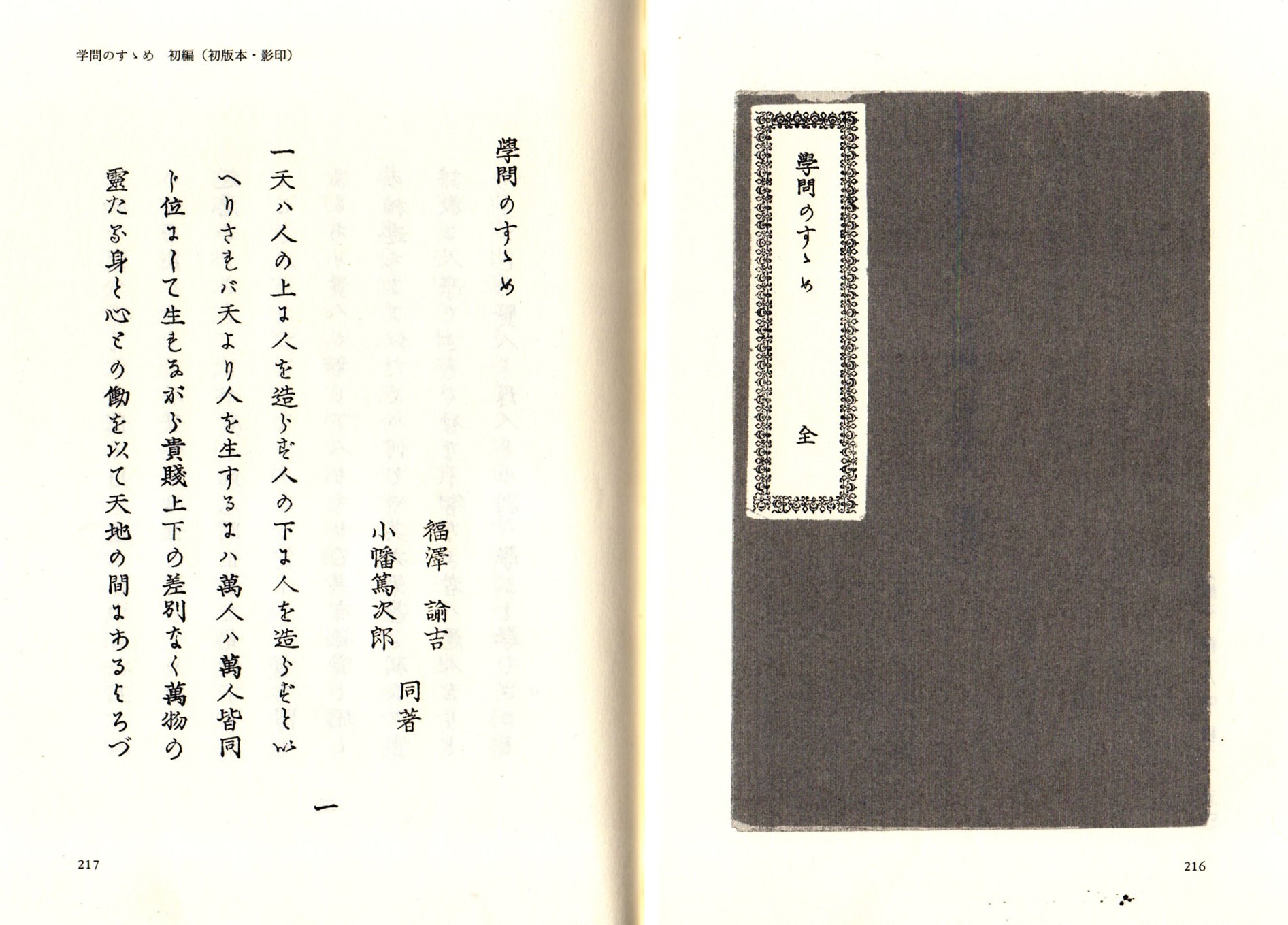
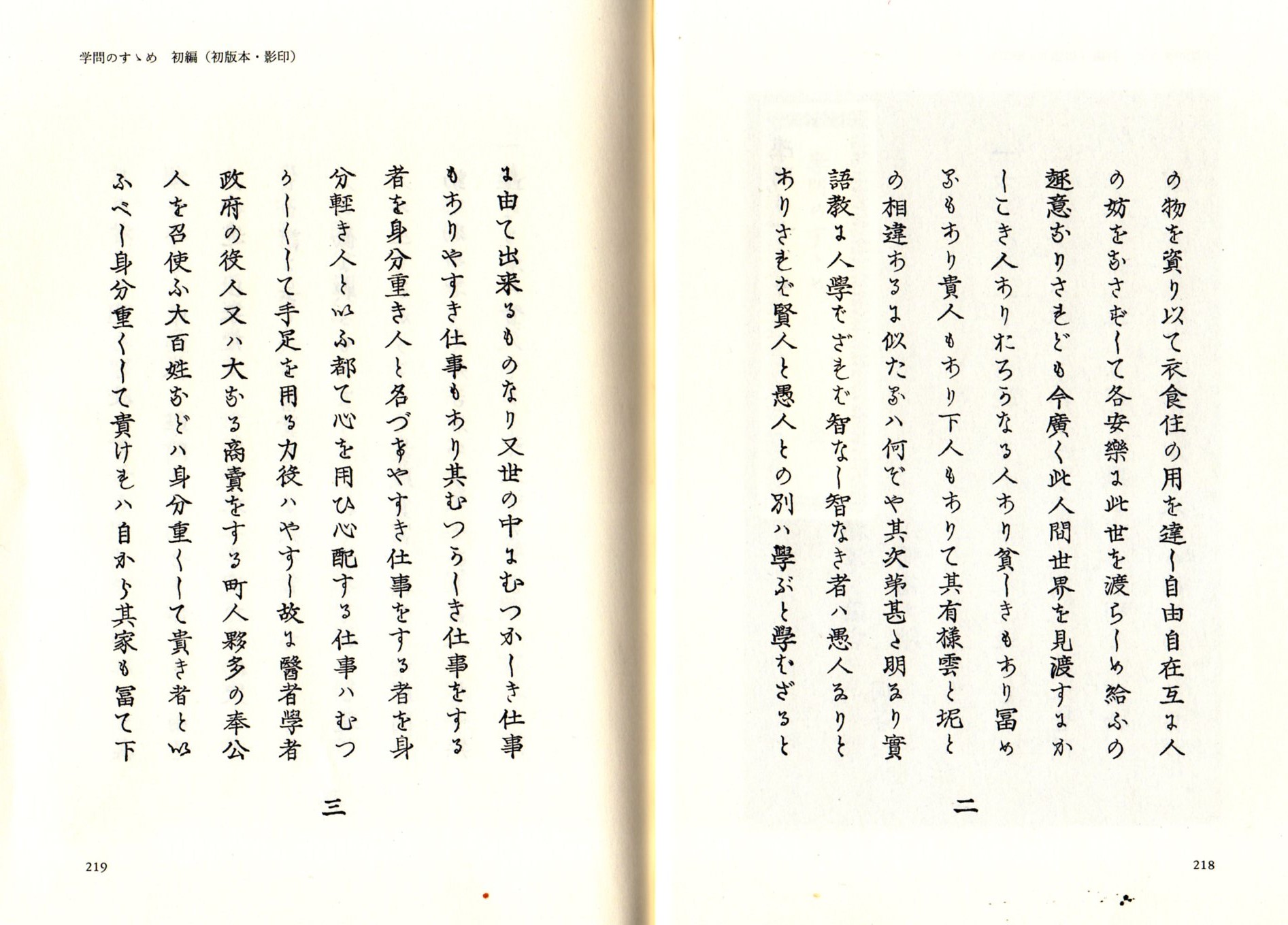
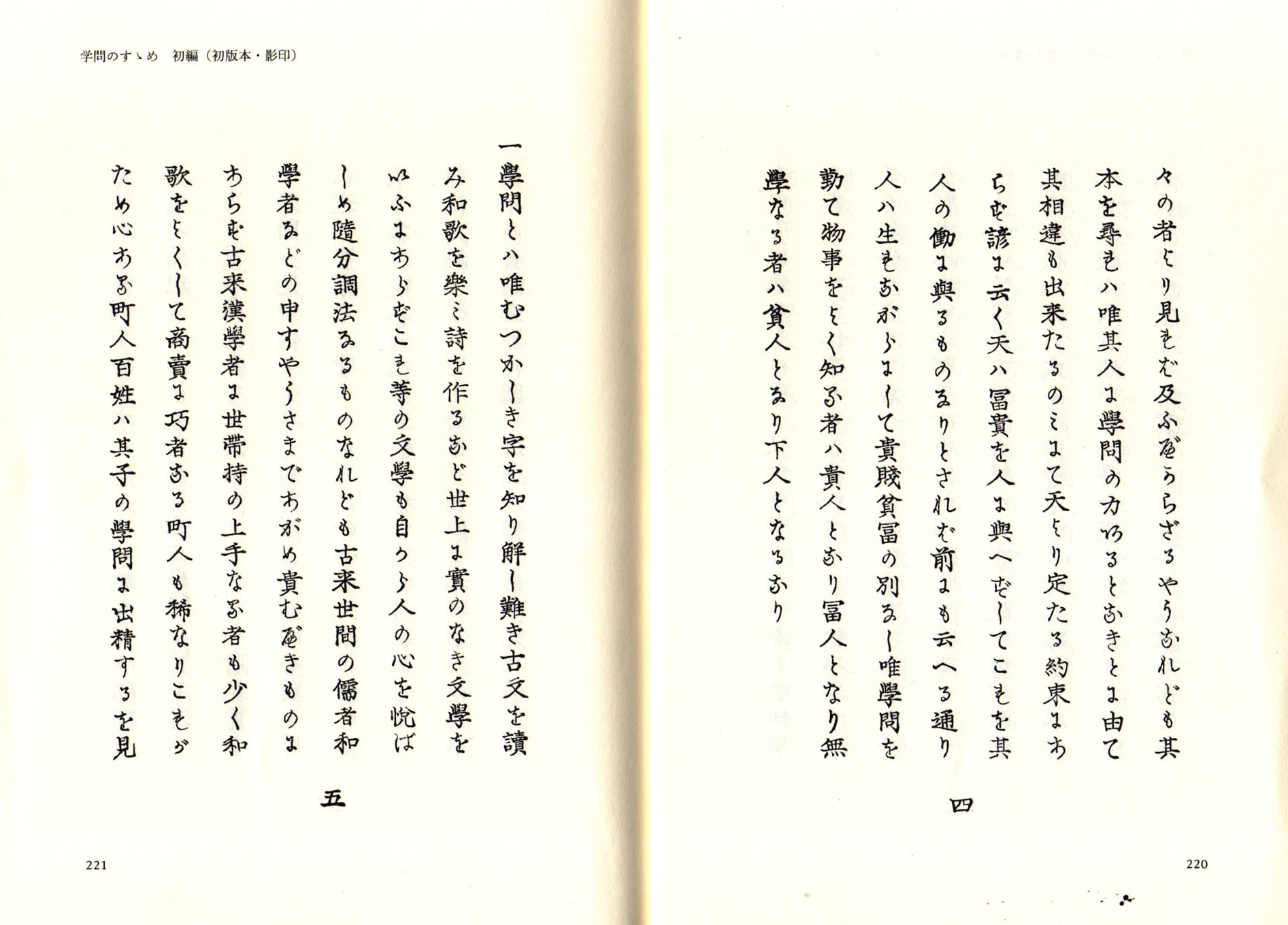
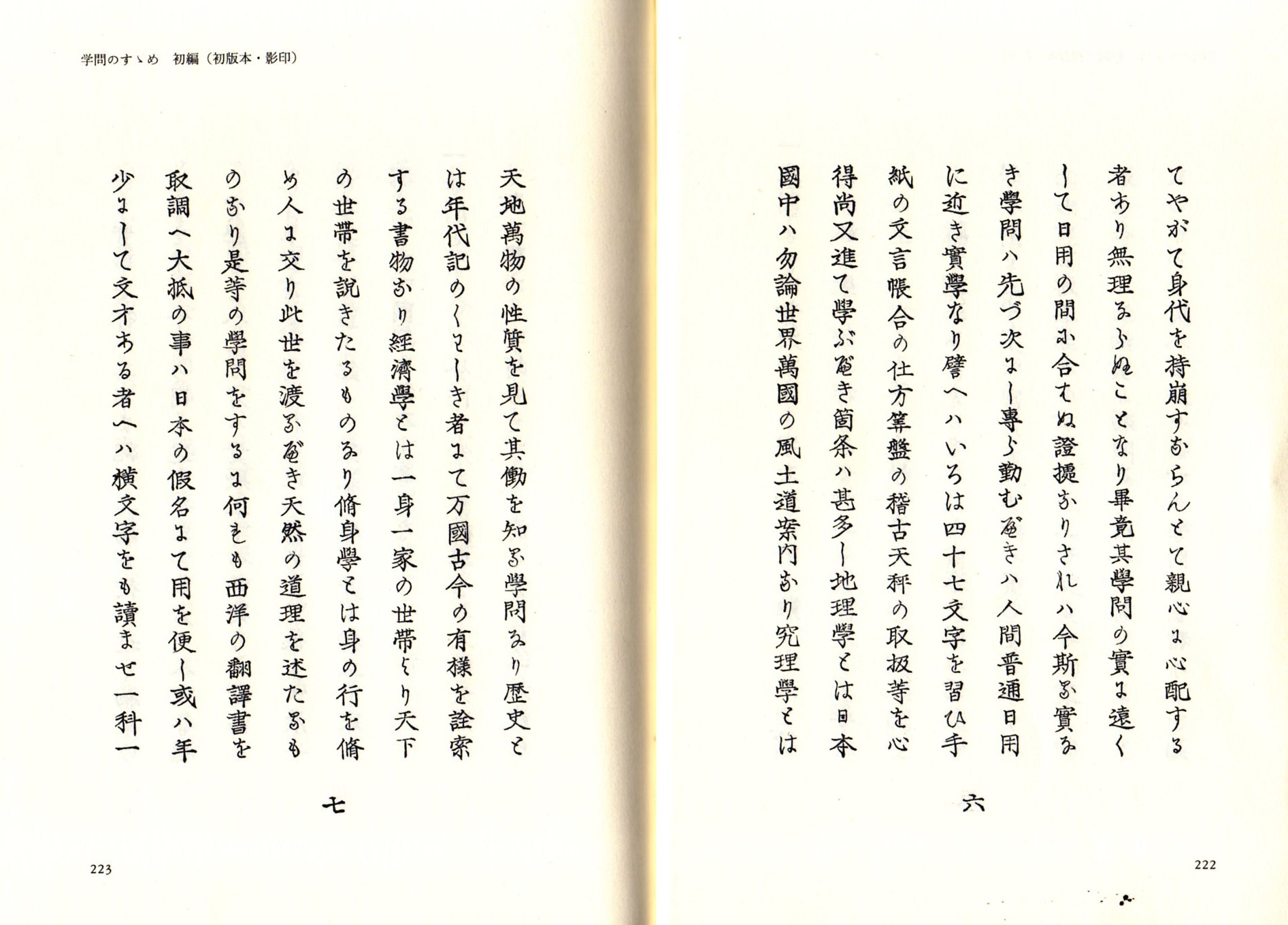
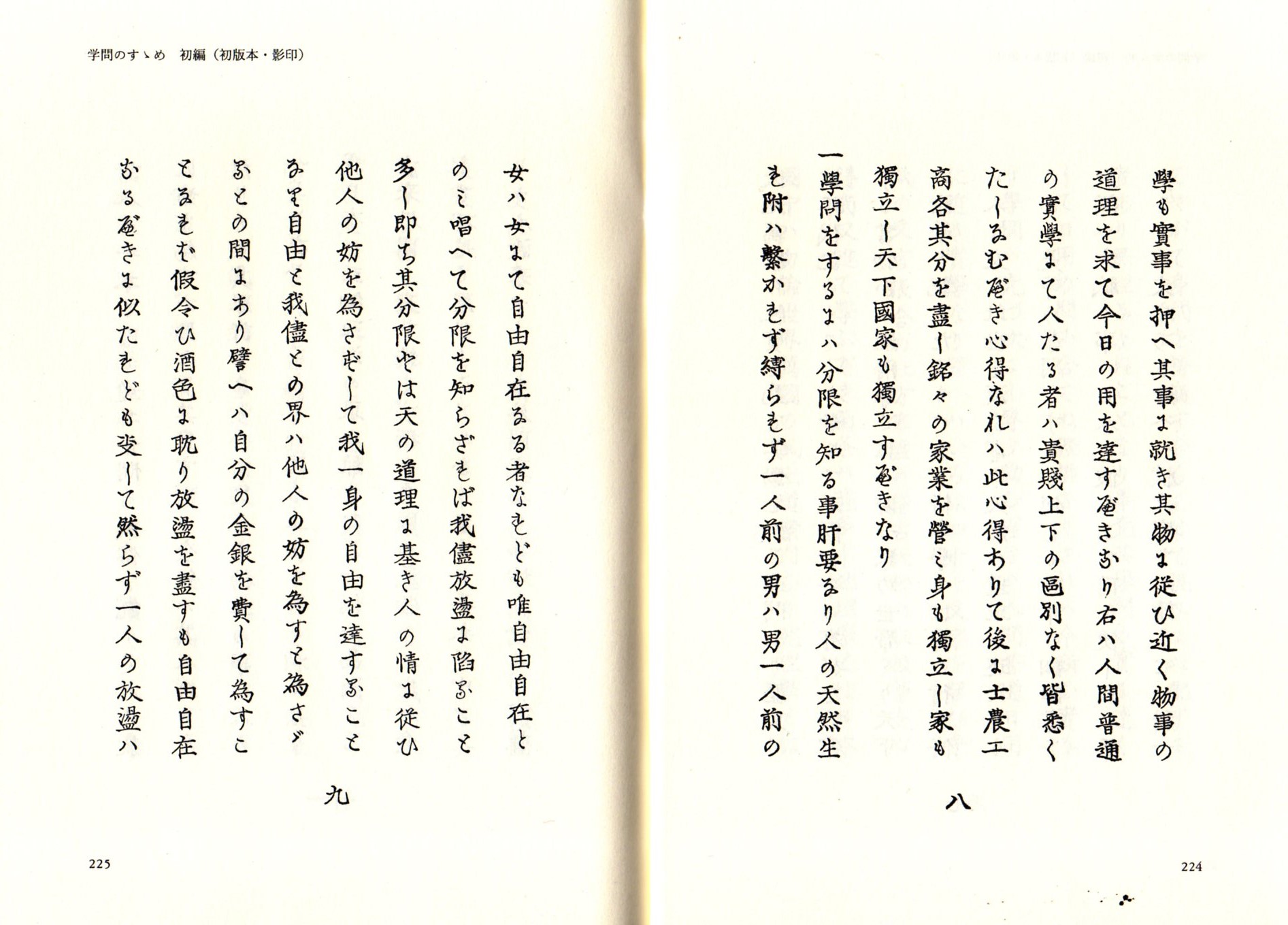
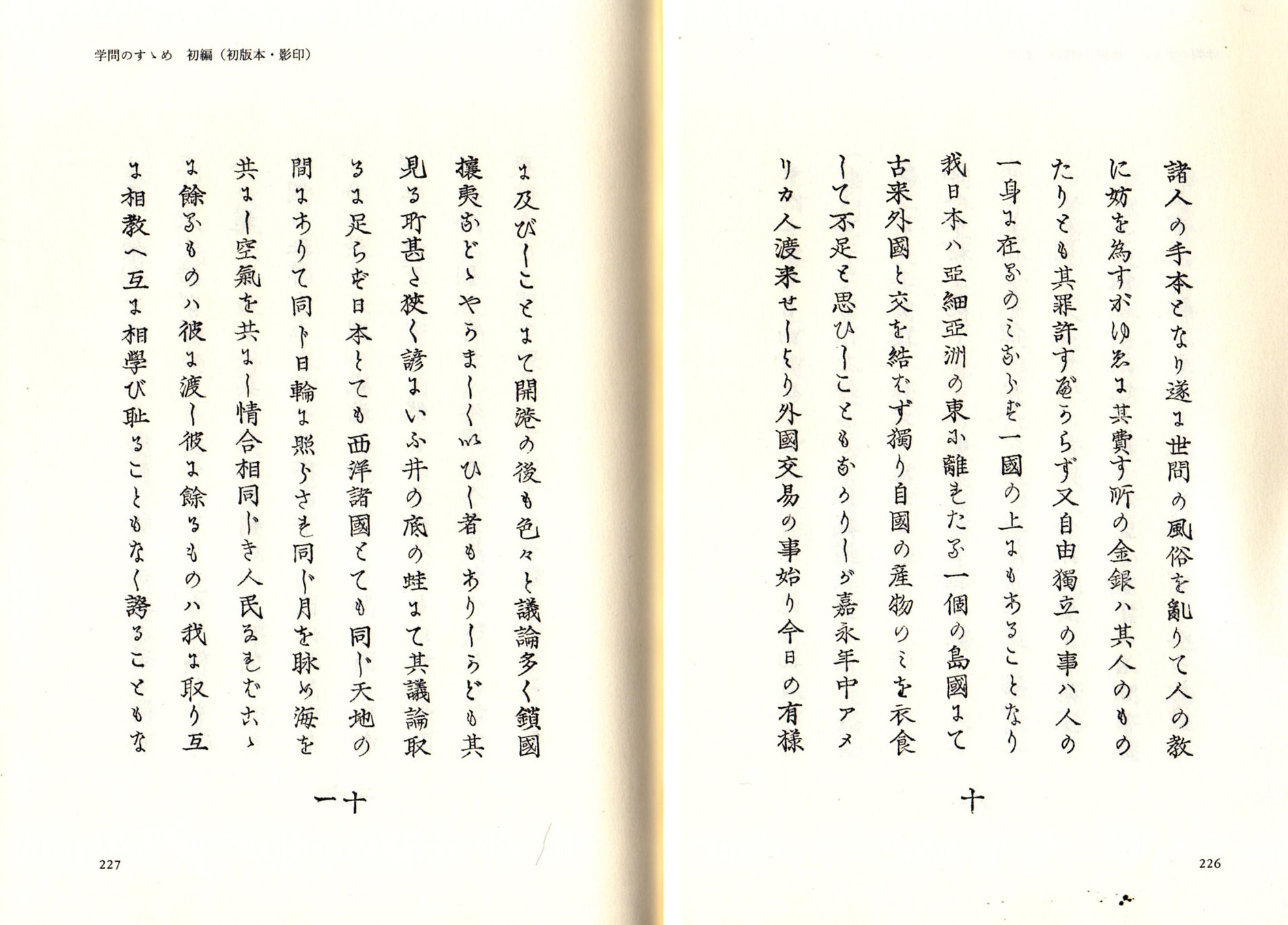
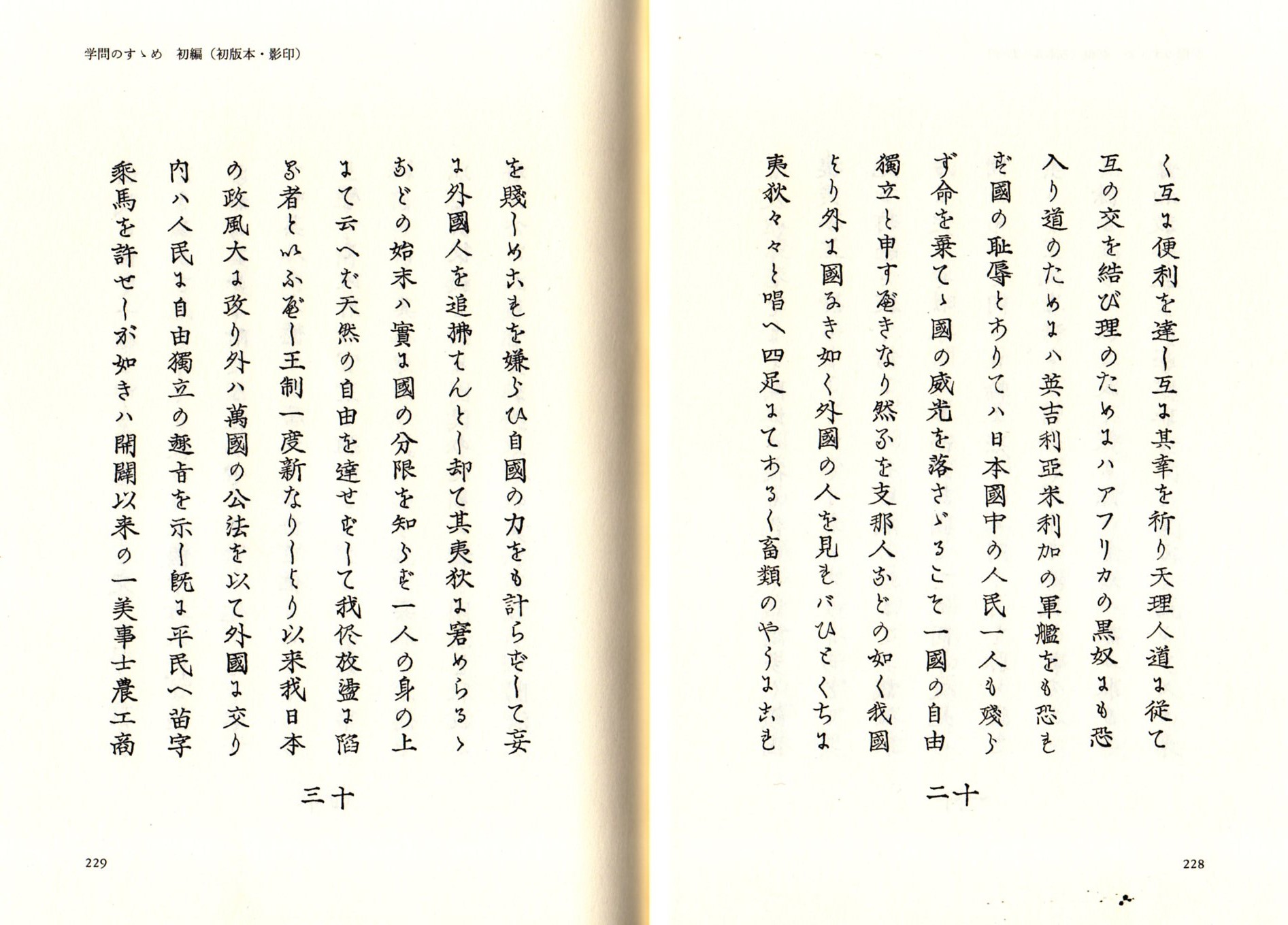
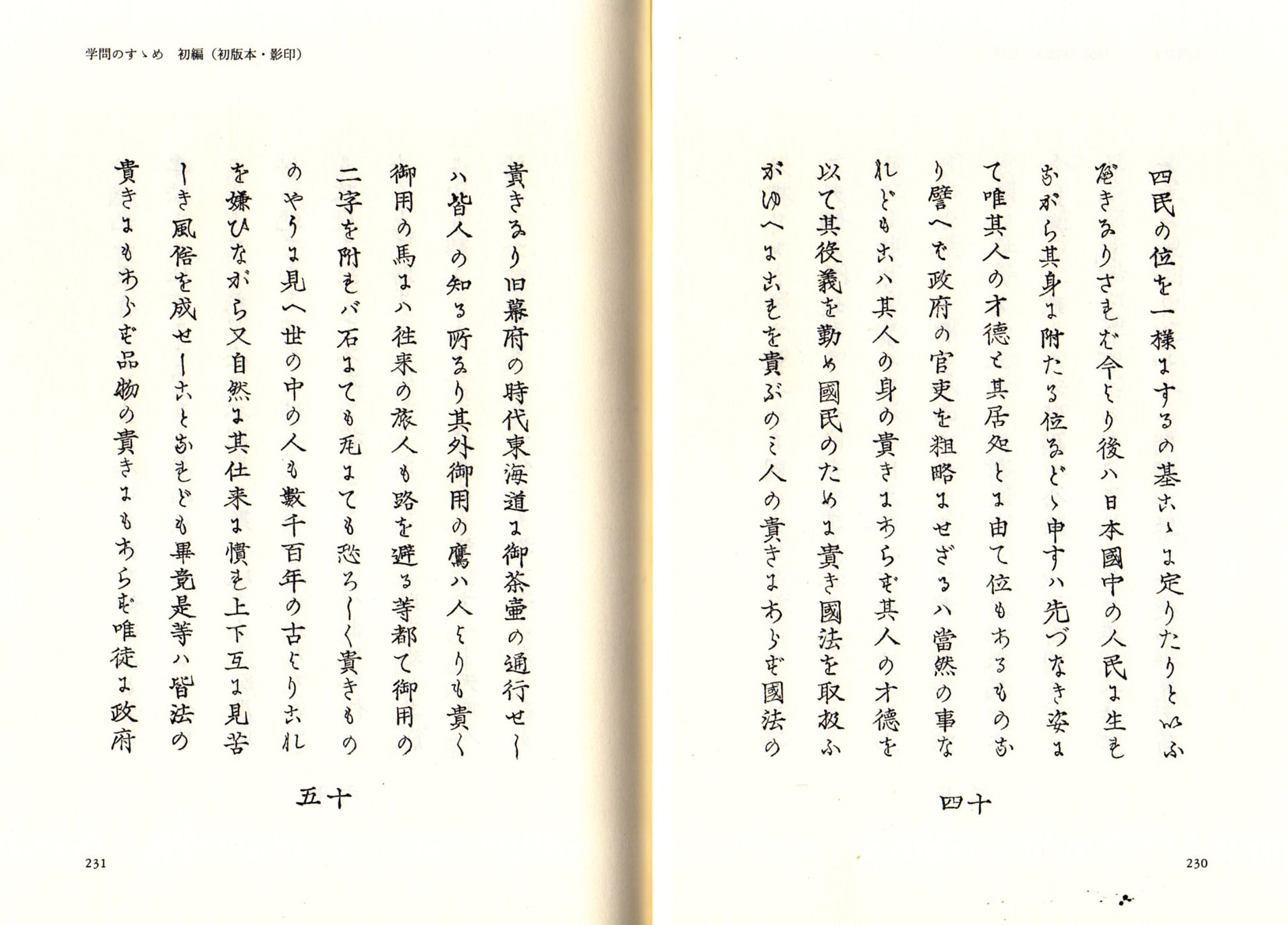
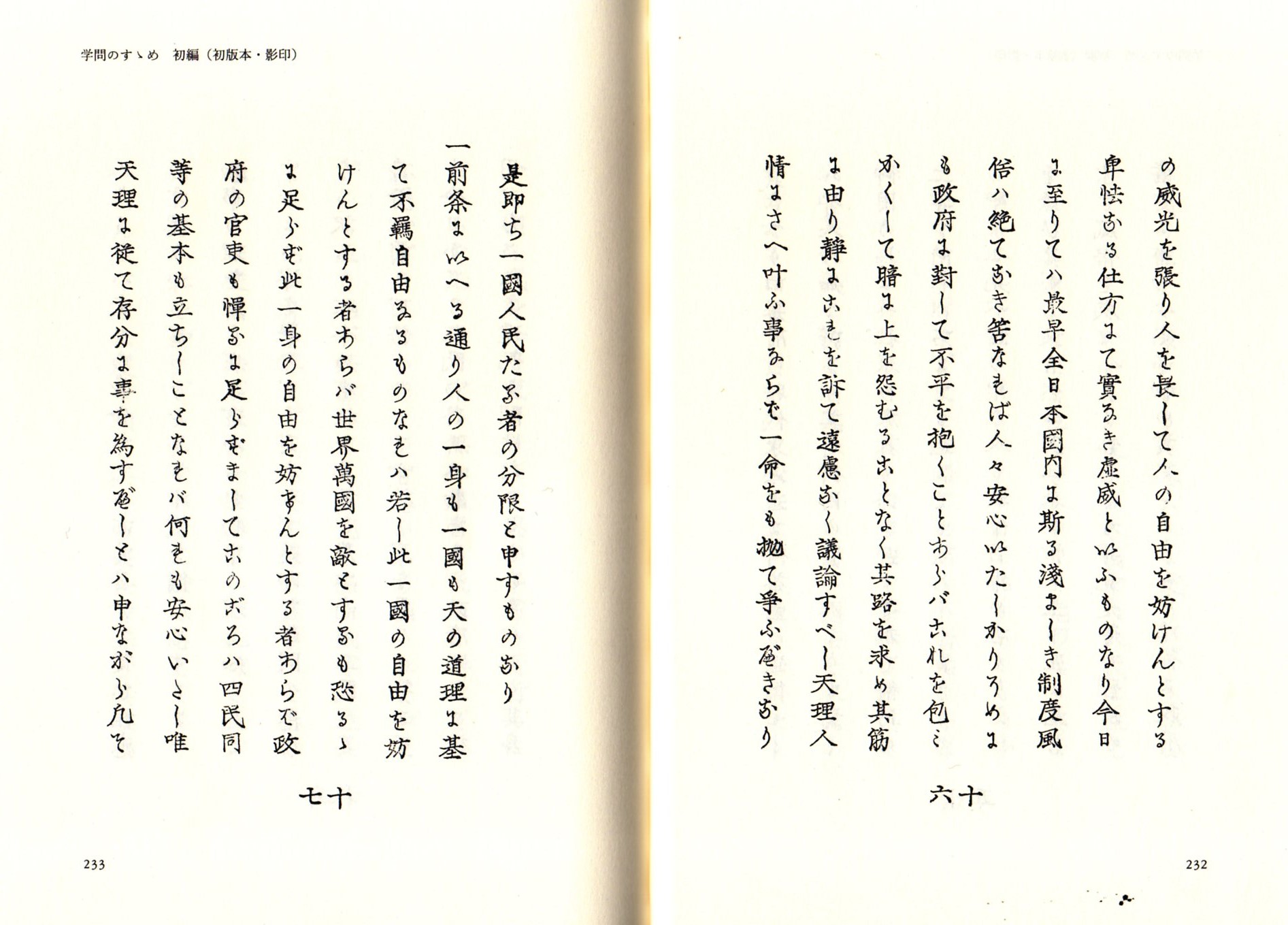
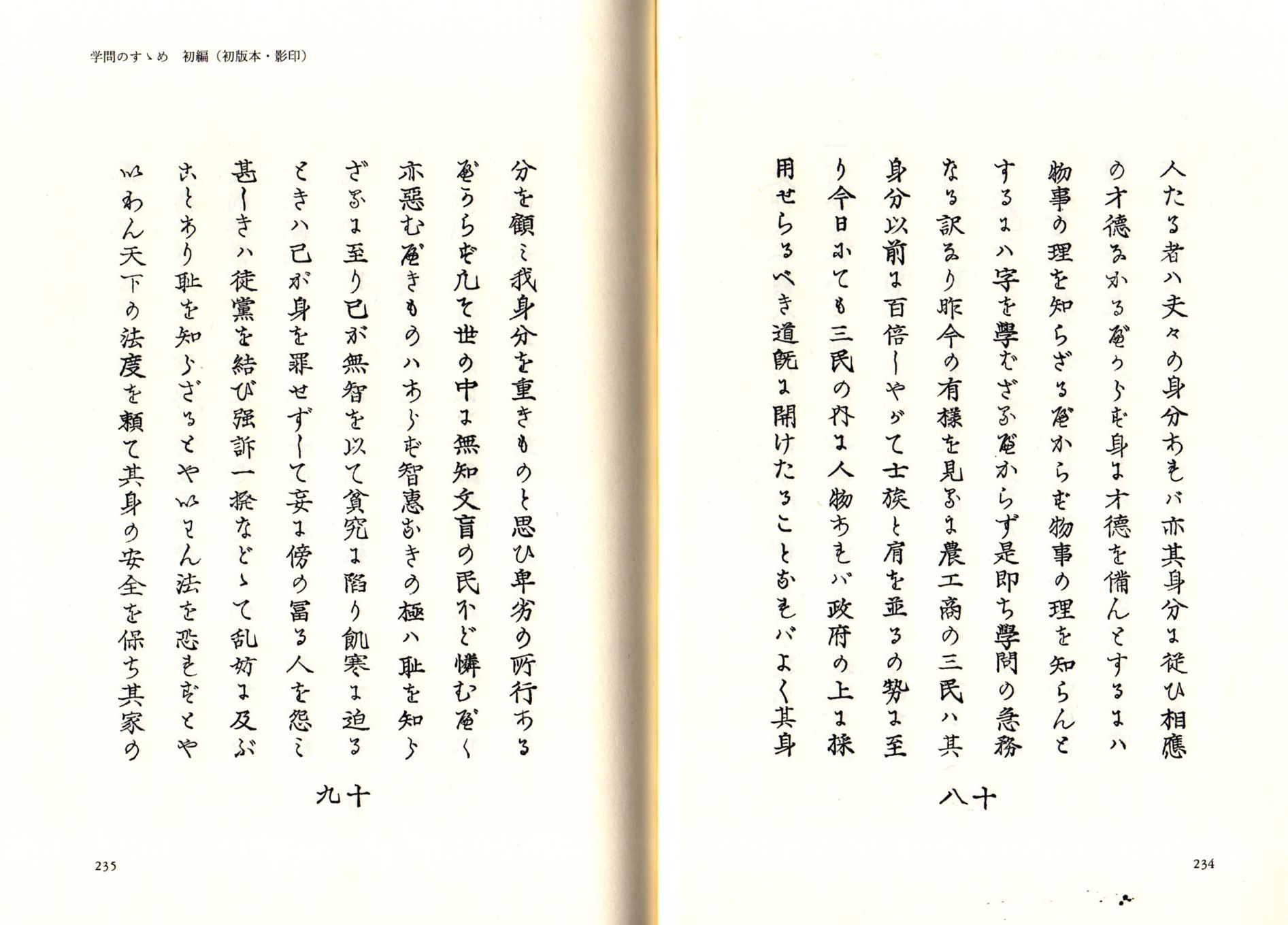
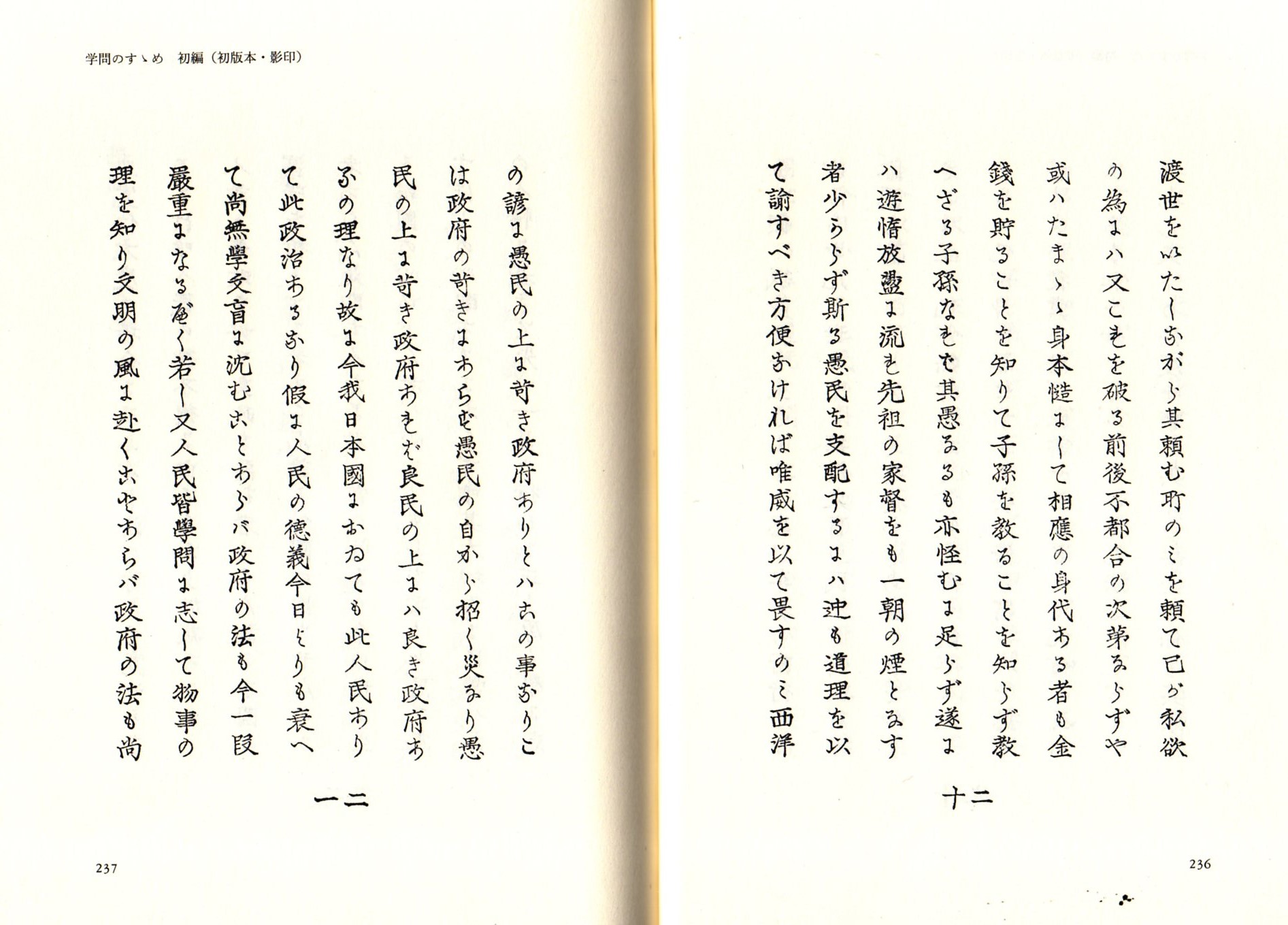
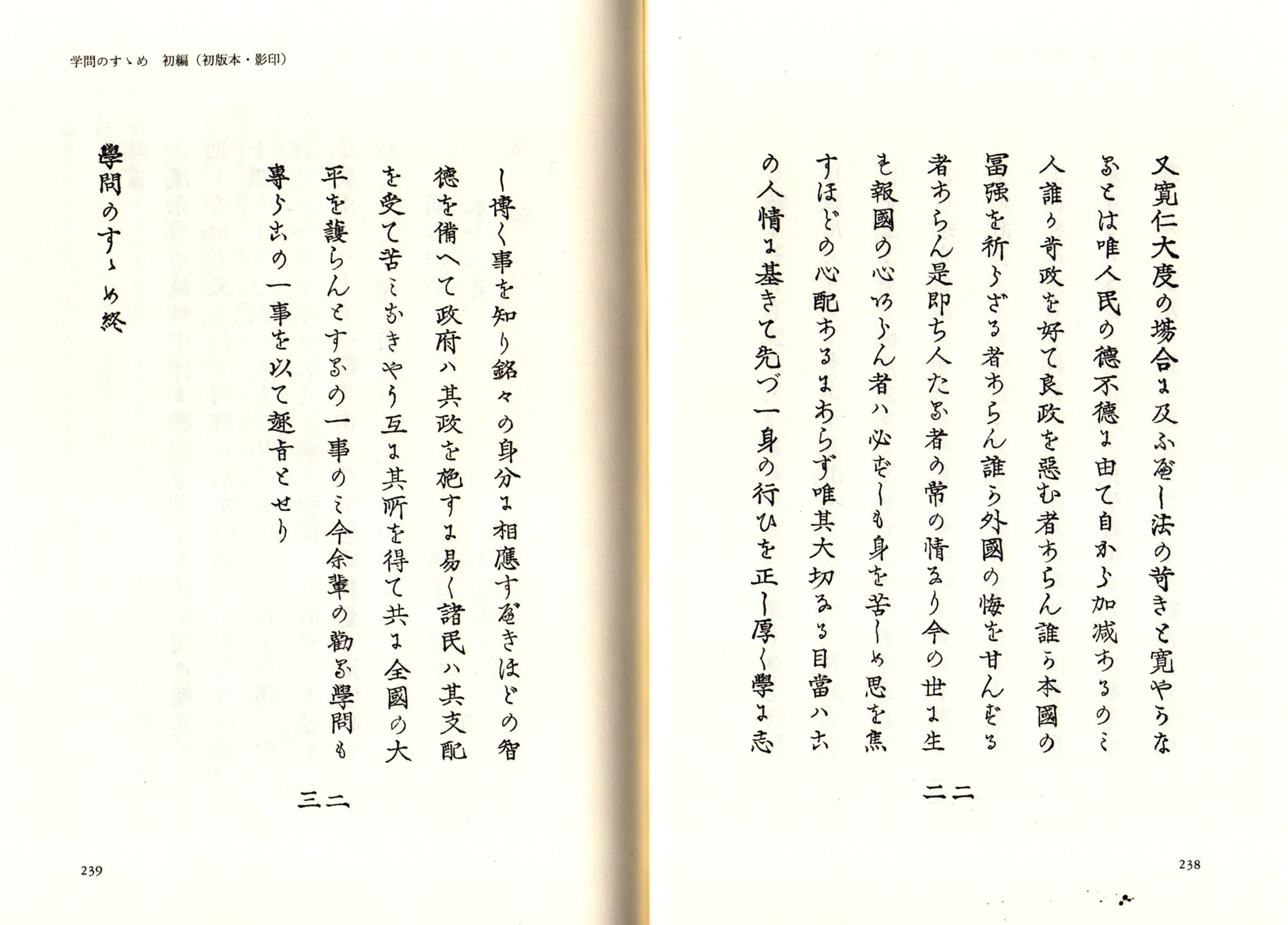
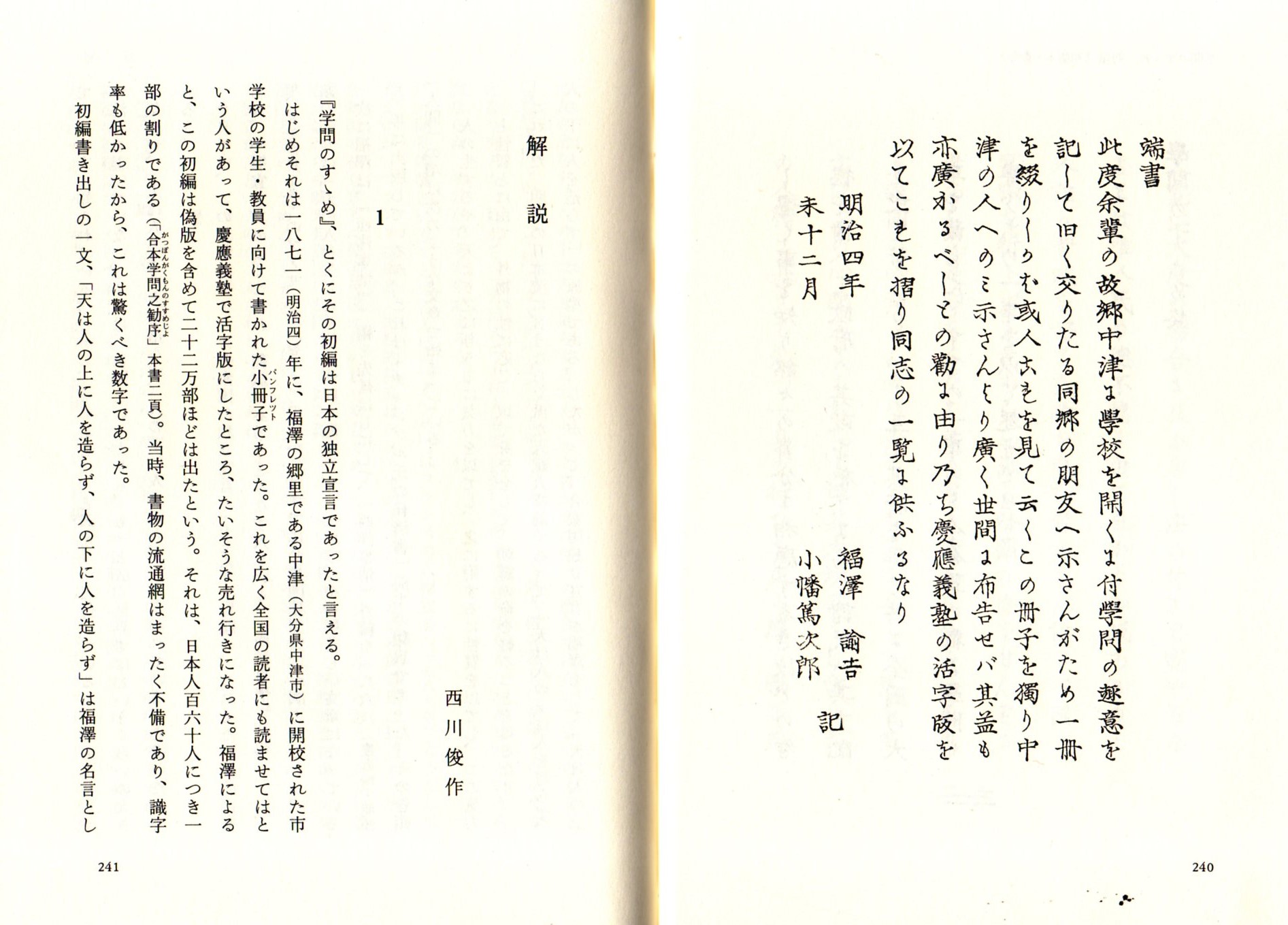
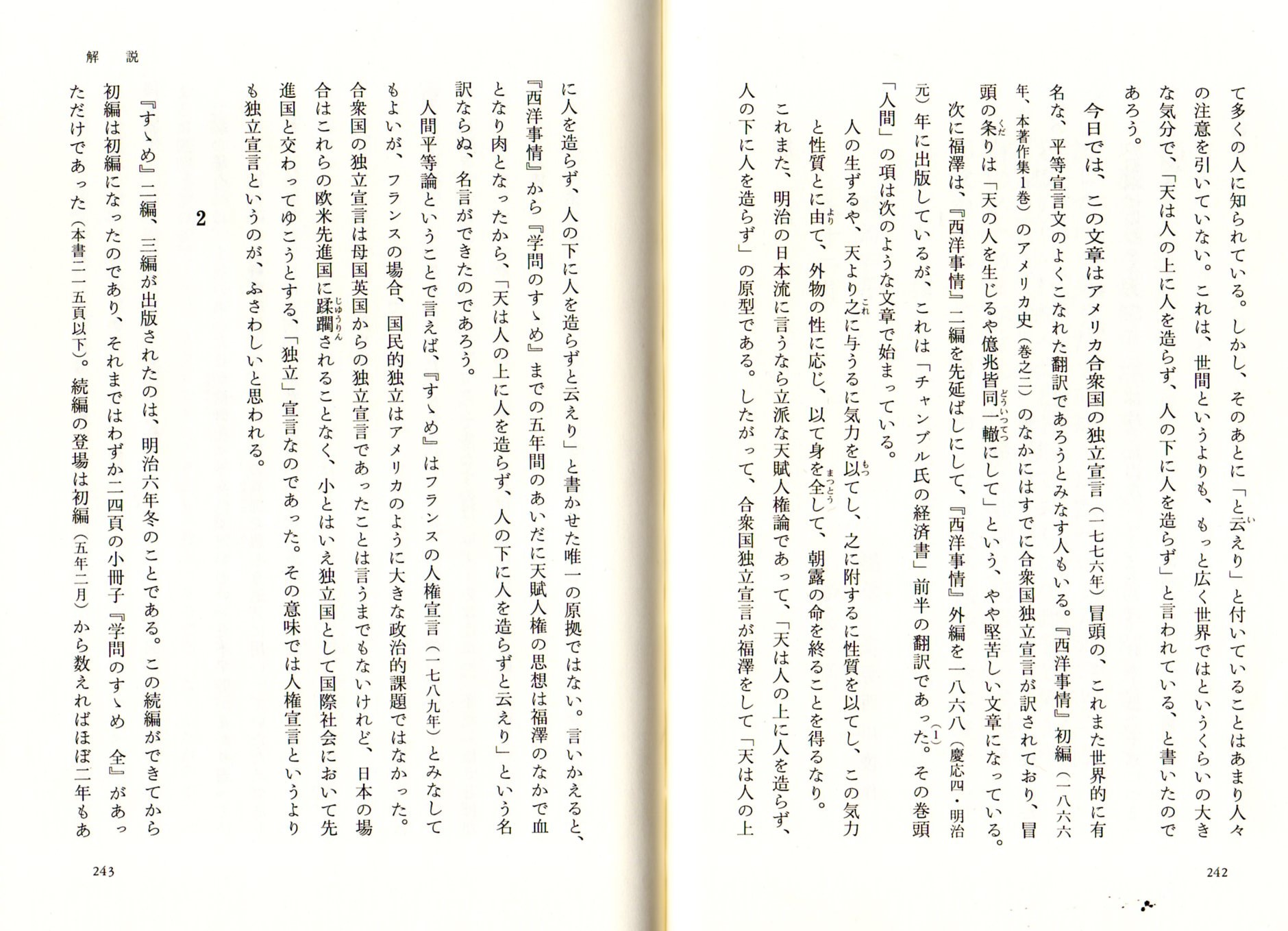
引用文献
| |